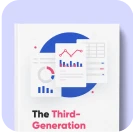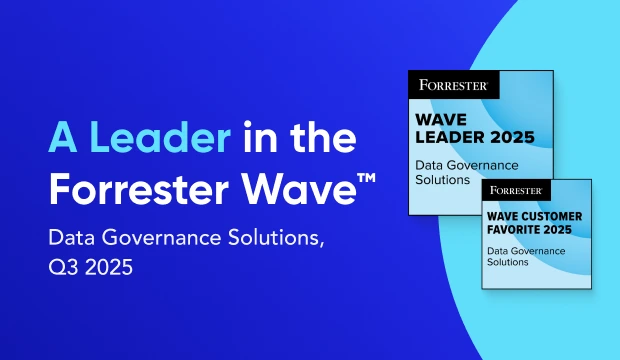Who is a Chief Data Officer & What Can They Do for You?

Share this article
A Chief Data Officer (CDO) is a high-level executive responsible for managing and leveraging an organization’s data as a strategic asset. They oversee data governance, data quality, data privacy, data strategy, and data integration across the organization, ensuring that the right data is accessible to the right people at the right time.
In today’s data-driven world, the role of a Chief Data Officer (CDO) has emerged as a linchpin, strategically steering organizations through the maze of data complexity towards business enlightenment.
In order to provide a comprehensive perspective, we’ll dissect what to look for in an ideal CDO, and discuss their vital roles in industries like Banking and IT.
Let’s dive in!
Table of contents #
- Who is a Chief Data Officer (CDO)?
- Why do we need a chief data officer?
- Responsibilities
- Chief data officer vs chief analytics officer
- Reporting structure and team composition
- Qualifications
- Chief data officer: Job description
- Average salary of a chief data officer
- What should you look for in an ideal chief data officer?
- Summarizing it all together
- Related reads
Who is a Chief Data Officer (CDO)? #
A Chief Data Officer (CDO) is an executive responsible for an organization’s data use, data management, data governance, and policy enforcement. As data has become an increasingly vital asset to organizations, the role of a CDO has become integral to strategic decision-making processes. Their role spans across managing data governance, data quality, business process management, and regulatory compliance associated with data.
A CDO oversees the collection, storage, management, quality, and protection of data. They also ensure data is reliable and insights derived are valuable, helping to drive strategic initiatives. Moreover, the CDO is tasked with ensuring the data strategies align with the business’s objectives and enable it to achieve its goals.
Why do we need a chief data officer? #
In today’s data-driven world, organizations generate vast amounts of data from different business operations. As such, harnessing this data’s potential and using it effectively becomes a key to success. This is where the role of a Chief Data Officer becomes critical.
These are the following roles of a chief data officer:
- Unlocking data value
- Governance and compliance
- Data quality and security
- Fostering a data-driven culture
- Data strategy alignment
Let us understand each of them one by one:
1. Unlocking data value #
A CDO can help an organization derive maximum value from its data, by transforming it into actionable insights that drive strategy and decision-making.
2. Governance and compliance #
The CDO ensures the organization’s data management practices comply with various local and international regulations, thereby mitigating risks associated with non-compliance.
3. Data quality and security #
They play a critical role in maintaining the quality of data, protecting sensitive data, and preventing breaches, ensuring the organization’s data is accurate, reliable, and secure.
4. Fostering a data-driven culture #
Perhaps one of the most important roles of a CDO is encouraging a data-driven culture within the organization. By promoting data literacy and ensuring accessibility to reliable data, they enable teams across the business to make data-informed decisions.
5. Data strategy alignment #
The CDO ensures that data strategy is aligned with business strategy, helping to guide investments and initiatives in the right direction.
In essence, a Chief Data Officer provides strategic direction, and drives a data-centric culture to leverage data as a strategic asset. This role is critical irrespective of the industry or sector, as effective data management and utilization are universal requirements for contemporary business success.
What are the responsibilities of a chief data officer? #
As the steward of an organization’s data, a Chief Data Officer (CDO) plays a vital role in managing and strategizing the use of data. The role of a CDO is diverse and multifaceted, reflecting the widespread significance of data in today’s business environment.
Here are the main responsibilities of a Chief Data Officer:
- Data governance
- Data strategy and implementation
- Data quality management
- Data security and privacy
- Data culture promotion
- Data insights and analytics
- Data architecture and infrastructure
- Liaising with stakeholders
1. Data governance #
One of the CDO’s primary responsibilities is establishing and ensuring adherence to an organization’s data governance framework. This includes:
- Data management standards
- Ensuring data accuracy and integrity
- Data privacy, and compliance with relevant regulations.
2. Data strategy and implementation #
A CDO develops a strategic plan for the organization’s data use. They work closely with other executives to align this strategy with the business’s goals and objectives. They also oversee the implementation of this strategy.
3. Data quality management #
The CDO is responsible for ensuring data quality across the organization. This means instituting data cleansing processes, verifying accuracy, ensuring data consistency, and establishing procedures for high-quality data collection and storage.
4. Data security and privacy #
Ensuring data is secure and privacy is maintained is a critical part of a CDO’s role. This means overseeing data security protocols, ensuring compliance with data privacy regulations, and managing any data breaches.
5. Data culture promotion #
A CDO works to promote a data-driven culture within the organization. They encourage all departments to use data in their decision-making processes and educate employees on the importance and usage of data.
6. Data insights and analytics #
The CDO works closely with data analytics teams to extract valuable insights from data. They ensure that these insights are effectively communicated and used to drive decision-making processes throughout the organization.
7. Data architecture and infrastructure #
They oversee the organization’s data architecture and infrastructure, making sure it can handle current needs and scale for future growth. They are often involved in decisions about adopting new data technologies and tools.
8. Liaising with stakeholders #
As the key data figure in an organization, a CDO often liaises with internal and external stakeholders, from department heads and employees to regulatory bodies and third-party vendors.
In essence, a CDO’s responsibilities span across all aspects of data management and strategy, working to ensure the organization is leveraging data effectively and responsibly.
Chief data officer Vs. chief analytics officer: Understanding the differences #
Both the roles of Chief Data Officer (CDO) and Chief Analytics Officer (CAO) revolve around the strategic use of data in a business context. However, they differ significantly in their scope and responsibilities. Understanding these differences can help determine which role is more suited to a particular organization’s needs.
Here’re the differences between a chief data officer and a chief analytics officer:
- Scope of responsibilities
- Data management vs. data utilization
- Strategy vs. execution
- Cultural and organizational roles
Let us understand each of them one by one.
1. Scope of responsibilities #
A CDO’s role is more overarching, concerned with managing the entirety of an organization’s data lifecycle - from data acquisition, quality, governance, to security. In contrast, a CAO primarily focuses on the use of data to derive insights and drive strategic decision-making. Their role is more focused on data analysis, data science, and creating business intelligence from data.
2. Data management vs data utilization #
The CDO’s main task is to manage and govern data, ensuring its quality, security, and compliance with various regulations. On the other hand, the CAO’s primary responsibility is to leverage data for insights, implementing advanced analytics to drive business decisions.
3. Strategy vs execution #
A CDO is generally more focused on data strategy - developing policies, improving data infrastructure, and aligning data goals with the organization’s strategic objectives. A CAO is typically more focused on the execution of this strategy - deploying data analytics, tools, and methodologies to extract insights and value from the data.
4. Cultural and organizational roles #
While both roles aim to foster a data-driven culture, a CDO’s role is to ensure data literacy, accessibility, and governance across the organization. Meanwhile, a CAO is more involved in using analytics to inform business processes, influencing tactical and strategic decisions based on data insights.
In essence, while both roles are crucial for a data-driven organization, the CDO focuses more on data management and governance, whereas the CAO is primarily concerned with the application of analytics to extract business value from that data.
What is the reporting structure and team composition of a chief data officer? #
The reporting structure and team composition for a Chief Data Officer (CDO) can vary depending on the organization’s size, industry, and strategic focus on data. Generally, the CDO is a senior executive who reports directly to the CEO or COO, underscoring the strategic importance of data in the organization.
Reporting structure #
The CDO typically reports to the CEO, COO, or sometimes the CIO, reflecting the strategic emphasis placed on data management. This positioning allows the CDO to have a broader view and influence on the company’s strategy, goals, and operations.
Team composition #
A CDO’s team often consists of data scientists, data analysts, data engineers, data governance officers, and data privacy officers, among others. The size and specific roles within the team will depend on the organization’s data strategy and objectives.
- Data scientists & data analysts: They are responsible for interpreting complex data and turning it into insights that can drive decision-making.
- Data engineers: They develop, construct, test, and maintain architectures such as databases and large-scale data processing systems.
- Data governance officers: They ensure data is consistent, trustworthy, and doesn’t violate any privacy or compliance laws.
- Data privacy officers: They are in charge of ensuring the company’s data handling practices are compliant with relevant privacy laws and standards.
The CDO’s team is tasked with managing data assets, ensuring data quality, and developing tools and strategies to derive insights from data. By leading such a team, the CDO helps foster a data-driven culture and ensures that data strategy is aligned with business strategy.
What are the qualifications of a CDO ? #
A Chief Data Officer (CDO) is a crucial executive role that requires a unique blend of technical, managerial, and strategic skills. The qualifications for a CDO can vary based on an organization’s specific needs, but there are several common educational and experiential requirements that many companies seek.
Let us understand the qualifications needed for a CDO.
1. Education #
Typically, a CDO holds a bachelor’s degree in a data-related field like Computer Science, Statistics, Mathematics, or Information Systems. Advanced degrees, such as a Master’s in Business Administration (MBA) or a Master’s in Data Science, are often preferred.
2. Technical expertise #
Proficiency in areas such as data management, data governance, data analysis, and database architecture is crucial. Familiarity with data-related software, programming languages (like SQL, Python, and R), and an understanding of machine learning and artificial intelligence can also be important.
3. Experience #
Most organizations require a significant amount of experience in data-related roles. This includes experience in data management, data strategy, and implementing data-driven solutions. Leadership experience is also critical, as the role requires managing teams and coordinating with other executives.
4. Business acumen #
Since the CDO is expected to align the data strategy with business goals, they should have a solid understanding of the business sector, its challenges, and opportunities.
5. Communication skills #
CDOs need to communicate complex data concepts to non-technical stakeholders. Hence, strong verbal and written communication skills are essential.
6. Regulatory knowledge #
Given the importance of data compliance and privacy, a good CDO should be well-versed in relevant regulations such as GDPR or CCPA.
7. Strategic thinking #
The ability to think strategically, plan for the future, and align data strategy with overall business strategy is vital.
In summary, the ideal CDO should have a blend of technical proficiency, business acumen, leadership skills, and strategic thinking capabilities. They should be comfortable working with large datasets, have a comprehensive understanding of the data lifecycle, and be capable of guiding the organization in its data-related endeavors.
Chief data officer: Job description #
A compelling job description is essential to attract the right candidate for the role of Chief Data Officer (CDO). It should clearly communicate the primary responsibilities, required qualifications, and skills necessary for the job. Besides, a good job description not only defines the role but also reflects the company’s commitment to leveraging data as a strategic asset.
We’ve put together a sample job description for a CDO which you could use or tweak according to your requirements.
1. Job title #
Chief Data Officer
2. Responsibilities #
- Establish and enforce data governance standards, policies, and procedures across the organization.
- Develop and implement an overarching data strategy aligned with the company’s business objectives.
- Ensure data quality and integrity, and manage data-related risks and compliance issues.
- Spearheaded data-related projects and initiatives to transform data into valuable insights for strategic decision-making.
- Foster a data-driven culture, promoting data literacy and accessibility across the organization.
- Collaborate with key stakeholders to integrate data strategies into business operations.
- Oversee data security and privacy measures to protect sensitive information and meet regulatory requirements.
- Identify and adopt new technologies, tools, and best practices to improve data management and utilization.
3. Qualifications #
- Bachelor’s degree in Computer Science, Information Systems, Statistics, or a related field. An advanced degree such as an MBA or Master’s in Data Science is preferred.
- Significant experience in data-related roles, with a strong focus on data management, data governance, and data analytics.
- Proficiency in data-related software and programming languages like SQL, Python, R, etc.
- Excellent leadership, strategic thinking, and organizational skills.
- Strong understanding of data privacy and compliance regulations.
- Exceptional communication skills, with the ability to explain complex data concepts to non-technical stakeholders.
- Demonstrated ability to align data strategies with business objectives and drive data-related projects to successful completion.
The CDO role is a senior executive position requiring a unique combination of data expertise, strategic thinking, and leadership. As the primary steward of our company’s data, the CDO will play a critical role in leveraging data as a strategic asset, driving our data strategy, and promoting a data-driven culture.
What is the average salary of a chief data officer? #
The compensation for a Chief Data Officer (CDO) can vary greatly based on factors such as the industry, company size, location, and the specific responsibilities and qualifications of the role.
According to Payscale, as of 2023, the average salary for a CDO in the United States is about $170,162 per year. However, this can range widely from around $102,000 on the low end to $233,000 on the high end.
Remember that besides the basic salary, other components such as bonuses, profit sharing, stock options, health benefits, retirement plans, and other perks may also form part of a CDO’s total compensation package. It’s also crucial to consider the cost of living in the job location when determining a competitive salary.
What should you look for in an ideal chief data officer? #
Selecting the right Chief Data Officer for your organization is a critical decision. This individual will not only manage your data resources but also shape the data culture and drive your data strategy.
Here’s what you should look for in an ideal CDO:
- Relevant educational background
- Rich experience in data management
- Successful data projects
- Leadership in previous roles
- Expertise in data tools and technologies
- Familiarity with compliance and regulations
- Excellent communicator
- Strategic thinking
- Proven ability to foster a data culture
Let us look into each of them one by one:
1. Relevant educational background #
An ideal CDO usually holds a degree in a data-related field such as Computer Science, Data Science, Statistics, or Information Systems. Advanced degrees like a Master’s or Ph.D. in these fields or an MBA can be an added advantage.
2. Rich experience in data management #
They should have extensive experience in managing large data sets, developing data strategies, and implementing data governance and data quality measures. Experience in multiple industries can bring a diverse perspective.
3. Successful data projects #
Look for a track record of successful data projects. This includes experience in leveraging data to solve business problems, developing data infrastructures, managing data migration, implementing data governance, and ensuring data security and privacy.
4. Leadership in previous roles #
Strong leadership skills are a must for a CDO as they’ll be managing a team and collaborating with various departments. Prior experience in a leadership position, especially in data management or analytics, is a significant plus.
5. Expertise in data tools and technologies #
Proficiency in data-related software, databases, and programming languages (like SQL, Python, R) is crucial. Familiarity with AI and machine learning technologies is a significant advantage.
6. Familiarity with compliance and regulations #
Given the importance of data privacy and compliance, the candidate should have a thorough understanding of data laws and regulations, such as GDPR or CCPA.
7. Excellent communicator #
As the bridge between the data and the rest of the organization, they should be able to clearly communicate complex data concepts to non-technical stakeholders.
8. Strategic thinking #
The CDO needs to align the data strategy with the business strategy. This requires strategic thinking, an understanding of the business domain, and the ability to foresee future trends and opportunities.
9. Proven ability to foster a data culture #
Look for candidates who have successfully fostered a data-driven culture in their previous roles, encouraging data literacy and promoting the use of data in decision-making.
In summary, an ideal CDO should have a solid background in data management, demonstrable success in data projects, leadership experience, excellent communication skills, and a strategic mindset. They should be passionate about data and its potential to drive business success.
Summarizing it all together #
The Chief Data Officer (CDO) is a vital role, responsible for creating and executing data strategy, ensuring data governance and compliance, and fostering a data-driven culture. They have a crucial impact across industries, with particular emphasis in the banking sector on data compliance, risk management, and customer insights, and in the IT sector on data strategy, data-driven innovation, and data quality.
An ideal CDO combines technical prowess, leadership, communication skills, and strategic thinking, with proven experience in managing large data projects. Their team typically includes data scientists, data analysts, and data engineers. A company seeking to recruit a CDO should clearly define the role’s responsibilities, qualifications, and reporting structure. The compensation should be competitive, reflecting the importance and scope of the role. The CDO’s crucial task is to transform data into a strategic asset to drive business value.
Chief data officer: Related reads #
- Data Quality Measures: Best Practices to Implement
- Data Privacy vs Data Security: How & Why They Aren’t Same?
- Data Management 101: Four Things Every Human of Data Should Know
- What is Data Stewardship?
Share this article











